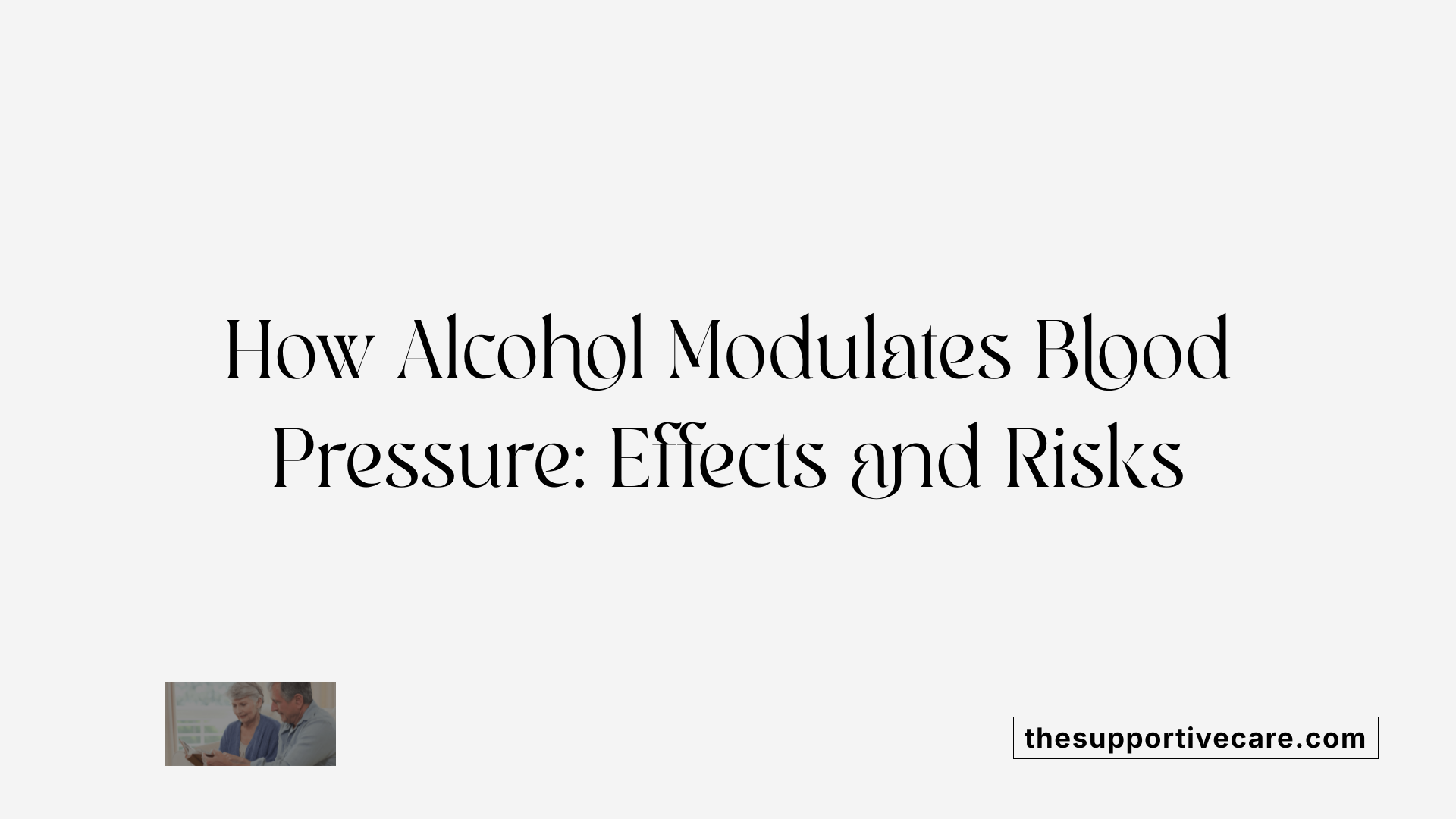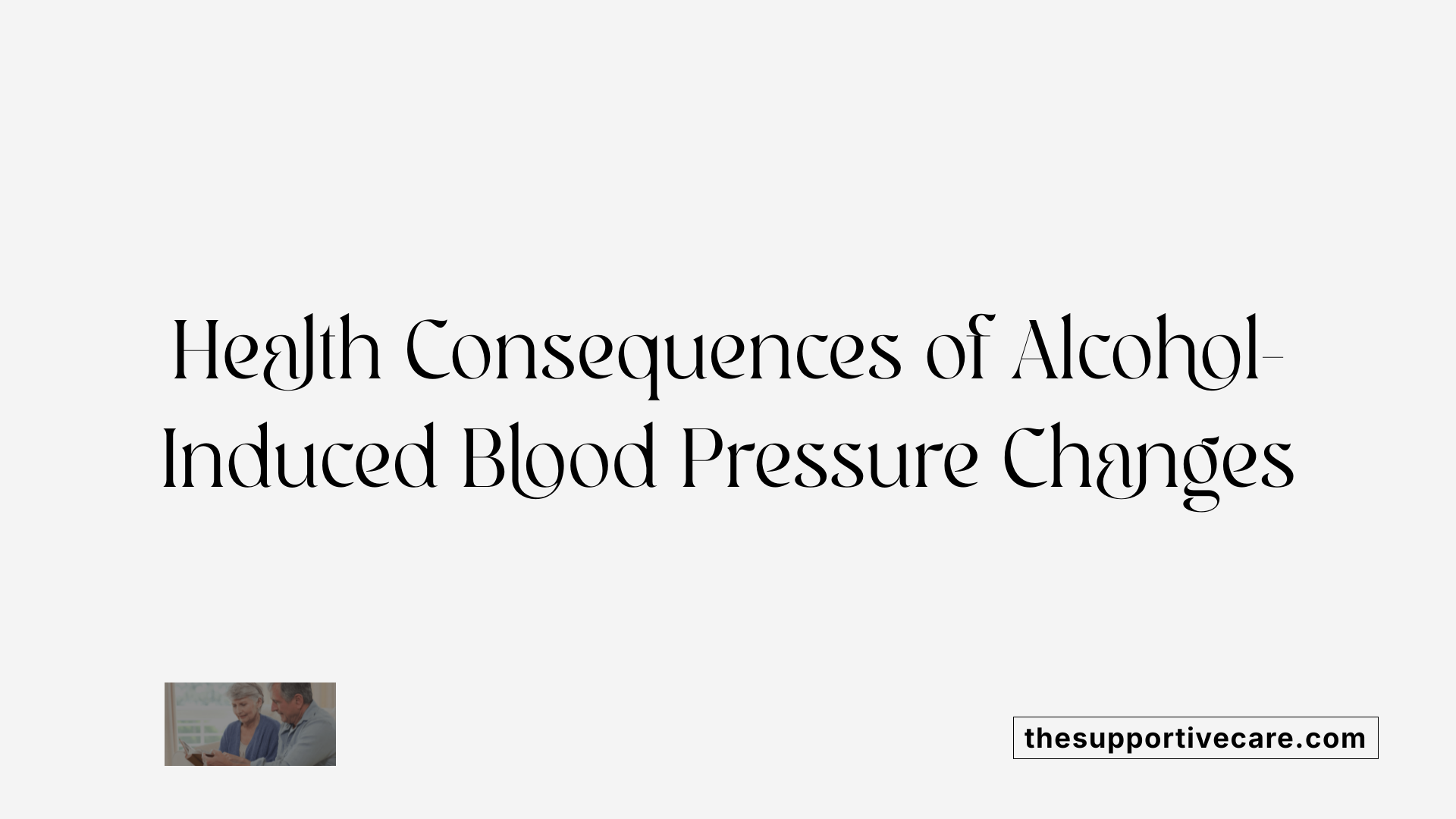Understanding Alcohol’s Impact on Blood Pressure and Cardiovascular Risks
Alcohol consumption has long been associated with various health effects, especially concerning cardiovascular health. This article explores how alcohol influences blood pressure, the underlying physiological mechanisms, and guidelines to help individuals make informed choices to safeguard their heart health.
Effects of Alcohol on Blood Pressure Levels

What are the effects of alcohol on blood pressure levels?
Alcohol consumption influences blood pressure in a way that depends on the amount and frequency of drinking. Moderate drinking, defined as up to one drink per day for women and two for men, often causes little to no change, and in some cases, a slight temporary decrease in blood pressure immediately after drinking. However, consuming alcohol beyond these guidelines, especially in larger quantities or during binge episodes, can significantly raise blood pressure.
Heavy or repeated binge drinking puts stress on blood vessel walls, causing them to narrow. This constriction requires the heart to pump with more effort, leading to higher systolic and diastolic pressures. Over time, persistent heavy drinking can cause long-term high blood pressure, increasing the risk of serious cardiovascular problems like stroke, heart attack, and kidney disease.
Moreover, alcohol affects physiological mechanisms regulating blood pressure. It can activate the sympathetic nervous system and raise levels of stress hormones such as cortisol and renin, further constricting blood vessels. It also impacts heart rate, often causing irregular or rapid rhythms.
Alcohol's interaction isn't limited to physical effects. It can interfere with the effectiveness of blood pressure medications, reducing their ability to control hypertension effectively. Therefore, limiting alcohol intake—avoiding binge episodes and adhering to recommended guidelines—is vital for maintaining stable blood pressure and reducing cardiovascular risks.
The Complex Relationship Between Alcohol Consumption and Blood Pressure

How does alcohol consumption affect blood pressure levels?
Alcohol's impact on blood pressure is intricate and depends on how much and how often it is consumed. Small amounts of alcohol, such as around 12 grams per day—roughly a standard drink—may cause mild increases in blood pressure and are associated with a slight rise in systolic and diastolic readings over time. For example, every additional 12 grams of alcohol daily can raise systolic blood pressure by approximately 1.25 mm Hg and diastolic by about 1.14 mm Hg.
With moderate to high doses, the effects become more pronounced. Immediately after consuming alcohol within six hours, blood pressure may actually decrease temporarily, especially with moderate consumption. However, as the body metabolizes alcohol, there can be a rebound effect leading to increased blood pressure after 12 hours, particularly following heavier drinking. Consuming more than 30 grams per day has shown a strong, dose-dependent relationship with higher blood pressure levels.
Repeated heavy drinking or binge episodes create long-term problems. They can sustain high blood pressure, weaken the heart muscle leading to conditions like alcoholic cardiomyopathy, and damage blood vessels. These effects amplify the risk of cardiovascular events, including strokes and heart attacks.
How does alcohol impact blood pressure acutely versus over the long term?
The immediate impact of alcohol, especially with moderate intake, tends to be a biphasic response: an initial decrease in blood pressure shortly after drinking, followed by a rebound increase later in the day if intake is high.
In contrast, chronic excessive alcohol use results in persistent hypertension. Long-term heavy consumption activates stress hormones, causes blood vessel narrowing, and impairs the regulation of blood pressure by the nervous system.
Studies have shown that reducing alcohol intake can lower blood pressure by about 3 to 5 mm Hg. Abstaining from alcohol altogether or limiting drinking to recommended guidelines can significantly diminish hypertension risk.
What are the recommendations for alcohol consumption for blood pressure management?
Health authorities like the American Heart Association recommend that men limit alcohol to two drinks per day and women to one. This moderation helps prevent the spike in blood pressure associated with heavy drinking episodes.
Avoiding binge drinking and maintaining alcohol-free days are vital strategies. If you already have high blood pressure, abstaining or strictly limiting alcohol can lead to meaningful reductions in systolic and diastolic measures.
Understanding how alcohol affects blood pressure at both individual and population levels underscores the importance of moderation. Keeping within recommended limits and managing other lifestyle factors like diet and exercise are essential for controlling blood pressure and reducing cardiovascular risks.
Patterns and Levels of Drinking: How They Influence Blood Pressure

How do different levels or patterns of alcohol consumption influence blood pressure?
Alcohol consumption impacts blood pressure in various ways depending on the amount and pattern of drinking. Moderate alcohol intake, defined as about 14 to 28 grams within a six-hour period, often causes immediate but temporary effects such as a slight decrease in both systolic and diastolic blood pressure, known as a biphasic response. During this initial phase, blood pressure might fall slightly; however, after roughly 13 hours, it tends to rebound and increase.
Low doses of alcohol, less than 14 grams in six hours, typically do not significantly alter blood pressure but can increase heart rate, which might pose issues for some individuals. Conversely, drinking larger quantities—more than 30 grams at once—initially causes a small decrease in blood pressure, but this effect is short-lived. Over time, and especially after the 13-hour mark, blood pressure often rises, contributing to the risk of long-term hypertension.
Consuming alcohol regularly above about 12 grams daily has been linked to progressive increases in blood pressure. Research shows that even moderate drinking can raise systolic and diastolic measures, gradually increasing cardiovascular disease risk. Thus, maintaining alcohol intake within recommended limits is crucial for blood pressure management.
In summary, different drinking patterns exert distinct effects on blood pressure: moderate, controlled drinking may have transient and reversible effects, while heavy or frequent alcohol intake contributes to persistent hypertension. Being aware of these variations is important for reducing cardiovascular risks associated with alcohol.
The Link Between Alcohol and Hypertension: Evidence and Risks

Is there an association between alcohol consumption and hypertension?
Yes, a substantial amount of scientific research confirms a clear link between alcohol intake and high blood pressure. Observational studies and clinical trials consistently show that higher levels of alcohol consumption, particularly binge drinking or regular heavy drinking, are associated with increased blood pressure.
Epidemiological data reveal that even low daily alcohol intake—around 12 grams or one standard drink—can cause a rise in systolic blood pressure by about 1.25 mm Hg and diastolic pressure by roughly 1.14 mm Hg. As alcohol consumption increases, these numbers escalate; for example, drinking 48 grams daily may raise systolic pressure by approximately 4.9 mm Hg and diastolic pressure by about 3.1 mm Hg.
Mechanistically, alcohol acts on several pathways to elevate blood pressure. It stimulates the sympathetic nervous system, increases the production of stress hormones like cortisol, and causes blood vessel constriction. Long-term, heavy drinking can damage blood vessels, weaken heart muscles, and cause inflammation—all factors that contribute to sustained hypertension.
Reducing alcohol intake, especially from high levels or binge episodes, has been shown to effectively lower blood pressure. For instance, abstaining or limiting alcohol to four or fewer drinks per occasion can decrease systolic and diastolic pressures by approximately 5.5 mm Hg and 4 mm Hg respectively. This evidence underscores the importance of moderation or abstinence in controlling hypertension and reducing cardiovascular risks.
Health Risks of Alcohol-Related Changes in Blood Pressure

What health risks are associated with alcohol-induced changes in blood pressure?
Alcohol consumption can significantly impact blood pressure, leading to various health risks. In the short term, having more than three drinks in one sitting can cause a temporary spike in blood pressure. This immediate effect occurs because alcohol stimulates the nervous system and narrows blood vessels, making the heart work harder.
Repeated episodes of binge drinking—defined as drinking large quantities of alcohol in a short period—can cause persistent increases in blood pressure over time. This sustained high blood pressure, or hypertension, is a major risk factor for cardiovascular issues such as stroke, heart attack, and kidney disease.
Long-term heavy drinking, typically more than three drinks per day for women and four for men, further increases the risk, potentially leading to chronic hypertension. Such high blood pressure often presents no symptoms initially but can cause serious health problems if untreated.
Alcohol’s effects on blood pressure are complex; it can cause an initial decrease followed by a rebound increase hours later, and it raises heart rate, stressing the cardiovascular system. Additionally, alcohol promotes neurohormonal changes—like sympathetic nervous system activation and cortisol release—that contribute to elevated blood pressure.
Overall, alcohol-related blood pressure changes pose significant health dangers. Reducing intake or abstaining altogether, especially for individuals with existing high blood pressure, is essential to lower the risk of severe health complications.
Physiological Mechanisms Linking Alcohol to Blood Pressure

What are the physiological mechanisms linking alcohol intake to blood pressure?
Alcohol influences blood pressure through several complex and interconnected pathways. One primary mechanism involves the sympathetic nervous system. When alcohol is consumed, it stimulates this system, leading to the release of stress hormones like adrenaline, which cause blood vessels to narrow (vasoconstriction). This results in an immediate increase in blood pressure.
Furthermore, alcohol impairs the function of baroreceptors—sensory receptors in blood vessels that help regulate blood pressure. When these receptors are less responsive, the body struggles to maintain stable blood pressure levels, especially during sudden changes.
Endothelial dysfunction is another critical factor. The endothelium is the thin layer of cells lining blood vessels that produce nitric oxide—a molecule that promotes vessel relaxation. Excessive alcohol consumption reduces nitric oxide production, impairing the vessels’ ability to relax and leading to increased vascular resistance.
Alcohol also activates the renin-angiotensin-aldosterone system (RAAS), a hormonal cascade crucial for blood pressure regulation. This activation results in the formation of angiotensin II, a potent vasoconstrictor, and the release of aldosterone, which causes the kidneys to retain salt and water, increasing blood volume and pressure.
In addition to these immediate effects, chronic high alcohol intake causes inflammation and oxidative stress, damaging blood vessel walls and making them less elastic. Over time, these changes contribute to persistent high blood pressure, or hypertension.
Elevated cortisol levels due to alcohol’s influence on the hypothalamic-pituitary-adrenal axis further promote vasoconstriction and sodium retention, intensifying the hypertensive effect.
Overall, alcohol’s impact on blood pressure involves a combination of nervous system activation, hormonal changes, and vascular damage, which together increase cardiovascular risk over time.
Managing Alcohol Intake for Heart Health
Understanding how alcohol influences blood pressure is crucial for heart health. While moderate drinking may have minimal effects, patterns like binge drinking and heavy daily intake substantially increase the risk of hypertension and cardiovascular disease. By adhering to recommended guidelines, avoiding binge drinking, and adopting a healthy lifestyle, individuals can significantly reduce their risk of alcohol-related hypertension and promote overall cardiovascular well-being.
References
- Alcohol: Does it affect blood pressure? - Mayo Clinic
- Limiting Alcohol to Manage High Blood Pressure
- How alcohol affects blood pressure and the heart - HSE.ie
- Routinely drinking alcohol may raise blood pressure even in adults ...
- Understanding the impact of alcohol on blood pressure and ...
- Alcohol and blood pressure | Drinkaware
- High blood pressure due to alcohol. A rapidly reversible effect
- Alcohol and Blood Pressure: Everything You Need to Know
- Alcohol Intake and Blood Pressure Levels: A Dose-Response Meta ...
- Alcohol and your blood pressure


































































































